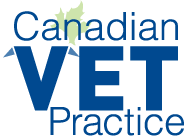
Canadian Vet Practice newsmagazine – bringing the whole veterinary healthcare team together in one exciting print + digital publication to keep busy veterinarians, veterinary technicians and practice managers up-to-date on the latest advancements in patient care and clinic management.
Continuing Education
Every issue of Canadian Vet Tech includes 3 articles with associated CE quizzes that can be completed online, at www.k2publishing.ca, to earn CE credits. Vet techs can complete a total of 12 quizzes each year to earn CE credits. Both current issue quizzes, and quizzes from prior issues, will be available for completion online. Canadian Vet Tech CE quizzes are approved for credit by all of the provincial accrediting associations in Canada.
Technically Speaking, by Kathleen Dunbar, RVT, VTS (Clinical Practice-Canine/Feline)
In each issue of Canadian Vet Tech we run an outstanding column by registered veterinary technician Kathleen Dunbar that offers vet techs an opportunity to really challenge themselves. Each article consists of 10 multiple choice questions. You can take the quiz online under our CE quizzes menu and then go to www.k2publishing.ca/technicallyspeaking.html to read an explanation of the answers.
Compassion fatigue and burnout hinder getting through the day!
By David Liss, MBA, RVT, CVPM, PHR
Working in a veterinary clinic is TOUGH! It's even tougher when there are roadblocks like compassion fatigue operating behind the scenes. Compassion fatigue is literally being fatigued from being compassionate. Another term that could be used interchangeably is empathetic exhaustion. It is EXHAUSTING being compassionate and empathetic. And we veterinary team members are required to do it 24/7. I have experienced this first-hand AND witnessed this in a large number of my colleagues.
Just what is compassion fatigue?
Technically, compassion fatigue is defined as a combination of secondary traumatic stress and burnout. Secondary traumatic stress is the experiencing of trauma second-hand (not experiencing it directly yourself) and subsequent activation of the sympathetic nervous system (SNS). This SNS activation occurs slowly and more insidiously than in primary traumatic stress (also understood as post-traumatic stress disorder). The manifestation is low level chronic stress that wreaks havoc on a person while still allowing them to continue to be high functioning. Burnout, on the other hand, is more of an organizational psychology term referring to the exhaustion employees feel when they are facing the perception of demands that exceed resources and the ability to do a job.
Have you felt everything in the world was against you? Have you ever been mad at your job? Do you have negative racing or anxious thoughts about work? These are all examples of compassion fatigue.
"Be objective," they said
Compassion fatigue is a relatively new term, though its effects have been documented back to the times of Carl Jung (turn of the 20th century). Often, the effects of compassion fatigue are somewhat ignored and downplayed because caregivers are supposed to be somewhat objectively removed from the trauma in their patients; it's often thought to manifest when a caregiver is overly caring. The concept of being HARD but brittle is rampant in health care. We are expected to be strong for our patients, yet, see them as a statistic. We are told, "Don't get too attached." However, any empathetic person cares for their patients, and through mirror neurons in the brain, manifests a level of reaction to another person or animals' trauma.
Symptoms of compassion fatigue
Symptoms of compassion fatigue reflect in typically negative life behaviors and can be very common in healthcare personnel. Anxiety, fear, loss of meaning, self-treatment and soothing (addictions), suicidal ideation, fatigue, irritability, sadness, depression, passive aggression, absenteeism, hating work, and on and on... The idea of a profession as more than just that creates a cycle where one expects the profession to give them something it cannot- soothing personal upset and stress.
Compassion fatigue manifests as chronic physiologic stress. It creates a tuning up of the sympathetic nervous system, where the chronic activation results in presentation of the symptoms noted above. If you ask yourself if you ready for a battle every day - and the answer is yes - you are under chronic stress. This is unavoidable in healthcare. And, in fact, empathy is how compassion fatigue 'gets in', or infects us. How do I see this show up in our profession? It is apparent in the profession in the high rate of suicide; the reports of substance abuse amongst colleagues; the crying by the practice owner who was attacked on social media, such as Facebook.
We must choose between helplessness or resiliency
Unfortunately, a way to NOT treat compassion fatigue, or reduce symptoms, is to fall into the victim mentality. Nothing is being done to you. This is NOT a popular thing to say. But it needs to be said. And I say it only because I care about each and every person in this profession. We have two options in a non-threatening stressful situation: we can change our reaction to it or leave it. Staying in it and espousing your inability to change it (helplessness) will not improve resiliency or help reduce symptoms.
Working in healthcare basically means always having a work environment where the demands outweigh the resources. Having to spend face-to-face time with patients and clients, where many other industries are automated, means that veterinarians (and technicians) will always have more clients than they can see in a day, week or month. When facing some of these perceived demands that exceed resources, I often approach things with a 'Have to vs. Get To' approach. 'I have to go to work' sets up the helplessness dynamic, whereas 'I get to practice my craft each day' removes the barrier and instead confronts the demand with humility and surrender. Being gracious and gentle with yourself helps alleviate some of the stress.
If chronic fatigue is a disease, resiliency is the antibody, not the cure. Resiliency is the process of mitigating chronic stress to reduce the ratcheting up of the sympathetic nervous system, in an effort to alleviate symptoms. Resiliency is the idea of being the calm during the storm, and it's a skill we must learn. This is the difference between NOT having an illness (denial of reality) or having a disease and developing antibodies (resiliency skills). The skills (self-regulation, intentionality, professional maturation, connection, and self-care) are the treatments for chronic fatigue and will help alleviate symptoms and improve quality of life.
Resiliency skills
Professional maturation
The first skill, professional maturation, involves recognizing the place of work in our lives and drawing boundaries around parts of our lives that work need not interfere with and where work can be relegated to. This is the transition from the hubris of 'saving the world' and remembering to own our own shortcomings and humanness. The biggest step of professional maturation is to relinquish stress over the outcomes. It is accepting that we do our best, and we do what we can, but what happens, happens. The WORK is your worth NOT the outcome. This is a VERY tough thing to wrap our heads around. To think that placing that IV in a critical patient doesn't ACTUALLY have an impact on the survival of my patient is a little unnerving. However, outcomes can be measured statistically, and no outcome is 100% predictable. Truly, whether your patient will live or die once you have done all that you can is mostly luck.
Narration
Narration is the second resiliency skill; it is narrating our professional journey. There is some psychoanalytical piece to this, like how therapists get us to talk about our problems, which releases the stranglehold these negative thoughts have on us. So, narrating our professional journey helps us to identify blind spots we may be operating from. For me, I went into this profession to be a veterinarian; I came out a regional operations manager. Who knows where we will end up and all the twists and turns we take on the way!
Self-regulation
Self-regulation is the third resiliency skill. This involves learning when our sympathetic nervous systems are running rampant and when they can be calmed down. There is a distinction between relaxation and self-regulation. Both are important, but self-regulation is more of a daily, life-long process and practice to calm the mind and muscles and ratchet down the SNS. Whereas relaxation technically is a one-time occurrence when you engage in a specific modality (yoga, breathing etc) away from the stressful activity to relax. The goal is not to do yoga 5 times a week, but rather, in the middle of the stressful activity, to 'relax the cheeks' - forehead, or buttocks - wherever you 'keep your stress', or practice widening your gaze to include the periphery (which has been shown to activate the parasympathetic nervous system) which will ratchet down the SNS, in the middle of the battlefield. This is how to learn how to be the calm during the storm.
Support and connection
Support and connection is the fourth resiliency skill. Do you empower or disempower people? Are you a member of groups who strive to support and connect you? Going out for drinks with colleagues and badmouthing clients, other vets and coworkers is venting. That is about commiseration, and not exactly what I am referring to. Venting is "Oh woe is me", and then a repeated, "I get it yes woe is you". Narration is about a verbal dumping of stress and a colleague, friend, or family member who then works WITH you to figure out what resiliency step you need to develop the strength in, in order to go back and face that issue. Reminders that the issue is not inherently bad or good, but simply an issue, allow us to then figure out what we need to tackle the issue. You need those that will not ONLY support you BUT call you out on your compassion fatigue symptoms (irritability, passive aggressiveness, negativity, etc). You need 3-5 people who will be your coaches and cheerleaders! These are people who will tell you when you are doing great AND identify your faults and weaknesses, for the purpose of strengthening them. Who is a part of your safety net?
Self-care
Self-care is the fifth resiliency skill. Self-care is about actualizing the variety of things that make up a well-rounded and happy life: joy, play, exercise, nutrition, sleep. These are in balance when our physical, psychological, emotional, spiritual and professional boundaries are in place. Self-care is not one thing and it is unique to each person. What do YOU need to feel rested, fulfilled, happy, and playful? Practicing self-care is not about just doing the THING that makes us happy, but rather, taking CARE of ourselves and identifying what we are struggling with and going through all the emotions that come with that. Many of us are not WILLING to take a look at our self-care and make changes. This means drawing a hard line for a professional and personal boundary. What is that boundary for you?
Many people do not make a lifestyle change until they have suffered enough, and it is often a LAST ditch effort. What will you change before you are at the precipice? For me, I stop taking work calls after 5pm. I don't do work and emails on the weekends. I stay intentional when it's time for family and friends and say NO to work during those times. I also do not let other's mental health issues (anxiety, fear, stress, upset) get in. I tell myself it's THEIR burden to bear. This does not mean that I am not supportive or empathetic, as I can see how that statement sounds cold-hearted. What I mean is, I have my own struggles, and work on those constantly, while being supportive and empathetic with others. But I do not confuse someone else's' struggles to a situation with my own.
David Liss, MBA, RVT, CVPM, PHRis a renowned technician educator, double board-certified veterinary technician specialist in emergency/critical care and internal medicine, and a certified veterinary practice manager. He has a diverse background in emergency and critical care nursing including lecturing internationally, authoring numerous articles and book chapters, and serving on various technician association committees. He has also received numerous awards including the Veterinary Technician Educator of the Year by Western Veterinary Conference and the Southern California Technician of the Year.
David spent many years in emergency/critical care veterinary nursing and was technician manager at two different 24-hour referral/specialty facilities in the Los Angeles area. He was also the Program Director of a Veterinary Technology program and the Hospital Manager of a 24-hour GP/ER Hybrid hospital in Los Angeles.
David currently is the Regional Operations Director for Amerivet Veterinary Partners.




